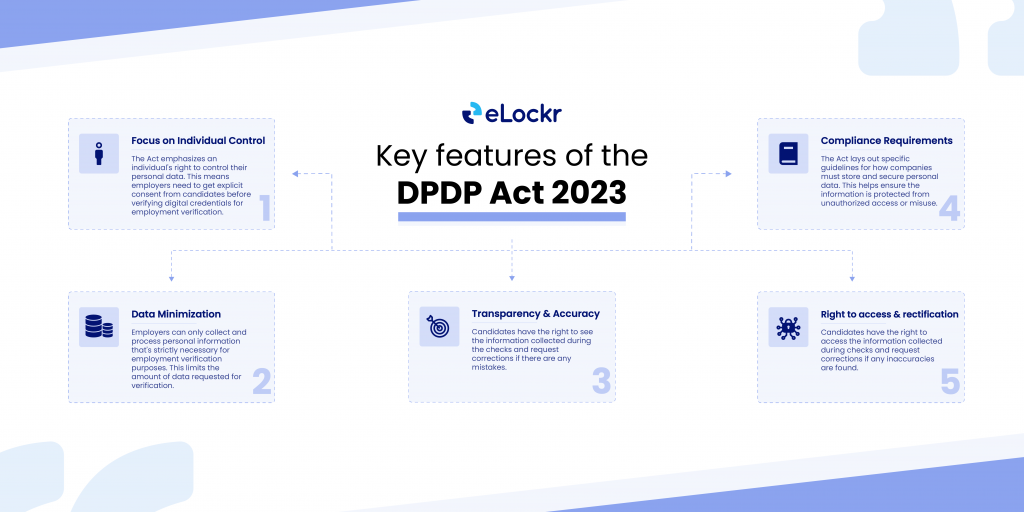In today’s competitive job market, finding the right candidate is crucial. Employment checks have long been a cornerstone of the hiring process, helping employers assess a candidate’s skills, experience, and work ethic. However, traditional verification methods often raise concerns about security, accuracy, and – increasingly important – compliance with data privacy regulations.
This blog post dives into the challenges of traditional employment checks, explores the implications of the Digital Personal Data Protection Act (DPDP) Act 2023 in India, and introduces a solution that streamlines the process while respecting candidate privacy.
The Pitfalls of Traditional Employment Verification: A Need for Modern Solutions
Employment verification is a vital step in confirming a candidate’s work history. However, traditional methods often introduce uncertainties into the process. Here’s how these methods fall short:
Vulnerability to Fraud: Email-based verifications are susceptible to manipulation by both the candidate and the reference source. Phishing scams can compromise sensitive information, while references might unknowingly provide inaccurate details. Additionally, a lack of formal record makes it difficult to guarantee the authenticity of the information received.
Inconsistent Data: Traditional methods often rely on unverified phone calls or online reviews. This opens the door to outdated, biased, or simply inaccurate information. Without a standardized approach, employers struggle to get a complete and reliable picture of the candidate’s skills and experience.
Privacy Concerns: Many employers conduct reference checks for employment verification without obtaining the candidate’s consent, potentially infringing on their privacy rights. A transparent and compliant verification process is essential for building trust with potential hires.
These issues raise a critical question: Is your workplace compliant with the DPDP Act?
Let’s understand the DPDP Act’s regulations and its importance in ensuring a responsible and trustworthy hiring process.
What is The DPDP Act 2023?
The DPDP Act, formally known as the Digital Personal Data Protection Act 2023, is a law passed by India’s Parliament. It regulates how companies handle digital personal data, including information collected during employment checks. India’s DPDP Act 2023 establishes a legal framework for how companies handle personal data, including information collected during employment or ex-employment verification .
Here are some key features of the DPDP Act 2023

Focus on Individual Control: The Act emphasizes an individual’s right to control their personal data. This means employers need to get explicit consent from candidates before verifying digital credentials for employment verification.
Data Minimization: Employers can only collect and process personal information that’s strictly necessary for employment verification purposes. This limits the amount of data requested for verification.
Transparency and Accuracy: Candidates have the right to see the information collected during the checks and request corrections if there are any mistakes.
Compliance Requirements: The Act lays out specific guidelines for how companies must store and secure personal data. This helps ensure the information is protected from unauthorized access or misuse.
Right to access and rectification: Candidates have the right to access the information collected during checks and request corrections if any inaccuracies are found.
Navigating the DPDP Act: Challenges and Solutions
While the DPDP Act protects candidate privacy, it adds complexity to the employment verification process. Here’s what employers need to consider:
Obtaining consent: Employers need a clear and documented consent process from candidates before performing employment checks. This consent should specify the information that will be collected and how it will be used.
Data security: Employers must implement appropriate security measures to protect the personal data collected during checks. This includes secure storage and access controls.
Data retention: Employers can only retain this data for a reasonable period after the hiring decision is made. They should have a clear data deletion policy in place.
How eLockr can help in making your workplace compliant?
eLockr, powered by OnGrid, offers a solution that streamlines employment & ex-employment verification while ensuring compliance with the DPDP Act. Here’s how eLockr addresses the challenges:
Explicit consent: eLockr facilitates a clear consent process. Candidates explicitly grant permission for ex-employers to share verification credentials on the platform.
DPDP Act compliance: eLockr’s secure system ensures data is handled according to the Act’s guidelines. This minimizes the risk of non-compliance and protects both employers and candidates.
Verified information: HR teams receive information directly from the source – authorized personnel at the candidate’s previous organizations. This ensures the information is accurate and verifiable.
Streamlined process: eLockr automates the verification process, allowing for faster turnaround times and reduced administrative burden for HR teams.
The Future of Background Verification: Transparency and Trust
The DPDP Act marks a shift towards a more transparent and privacy-conscious approach to background verification. By adopting solutions like eLockr, employers can ensure they are compliant with the law while also gaining access to accurate and verifiable information about potential hires. This ultimately leads to better hiring decisions and a more trustworthy recruitment process for everyone involved.
Building trust with candidates and making informed hiring decisions based on accurate information are essential for success in today’s talent market. By prioritizing compliance with the DPDP Act and adopting secure verification methods, companies can achieve both these goals.





Leave a Reply